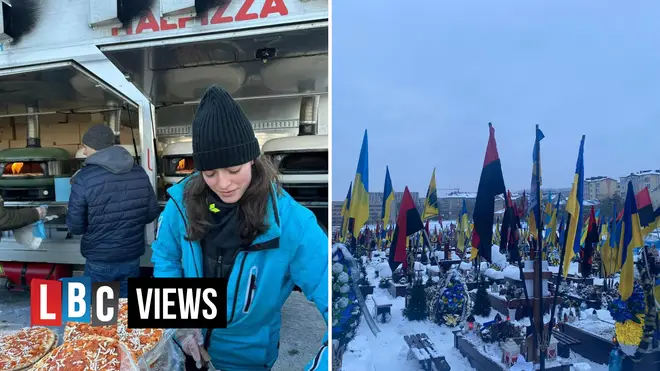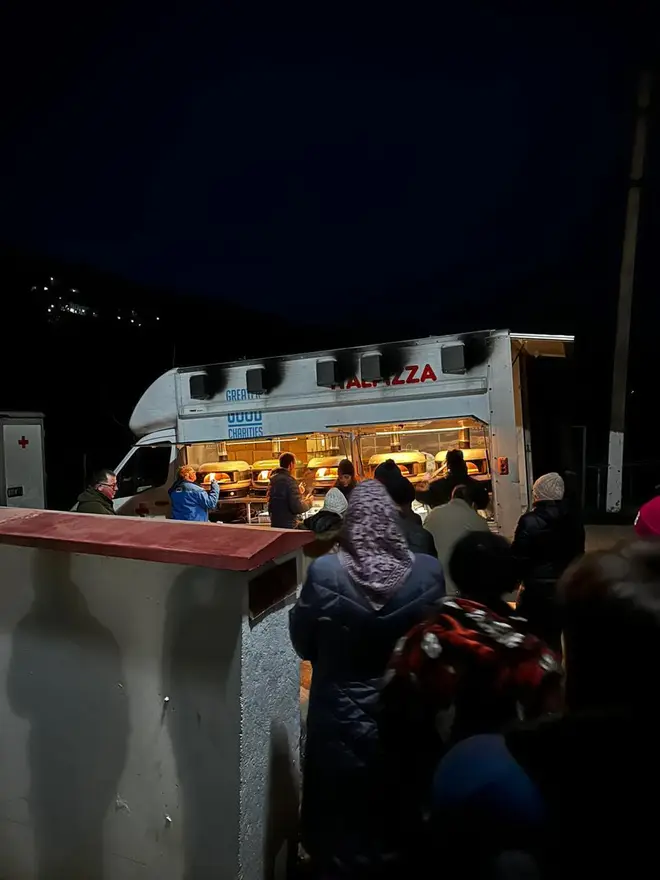
Nick Ferrari 7am - 10am
19 December 2023, 10:14 | Updated: 19 December 2023, 10:38

Volunteering in Ukraine has opened my eyes to the human consequence of war, which we are failing to recognise.
Each year in Britain, on the 11th of November, we remember the men who gave their lives during the two world wars. As the list of names who lived in the local area is read out in church, people take note of the men who didn’t make it to see 21.
Who died younger than them. This yearly act of remembrance humbles us, and reminds us of the eternal reality of war: it scoops up ordinary people and launches them into extraordinary circumstances.
For many, the horrors of the two world wars are simply ‘history’.
In Ukraine, they are the reality. When my grandmother watched a video of the air raid sirens going off in Lviv, she was thrown back in time, to when she was a child, growing up in the blitz.
The nature of rolling news means it has fallen out of the headlines and off the front page. But this doesn’t mean the situation is better or Ukraine is ‘winning’. It simply means we are forgetting to ask.
I’ve been based in the West of Ukraine with Siobhan’s Trust, making pizzas for internally displaced people (IDP), individuals, and families who are affected by the conflict. We go to hospitals, schools, orphanages, IDP refugee centres and more.
One of my colleagues has been with the Trust for over a year. Previously, he served in the Parachute Regiment of the British Army.
He went on multiple tours to both Afghanistan and Iraq. Despite the indisputable horrors of those conflicts, he is adamant nothing he’s seen compares to the situation out here.
"Nobody in NATO has fought in any kind of combat of this scale, or this ferocity, since World War II," he told me, "It is trench warfare, with modern weapons."
Throughout my time here, we have discussed in great depth the reality facing Ukraine’s front-line soldiers. Rather than skill, he says a soldier’s survival is down to luck.
"The front line against Russia is the longest since World War II. When you pass the zero line into the front, you might as well roll a dice."

Across the West, small signs of the war penetrate the otherwise oblivious landscape: Rogue checkpoints, market stalls selling extra kit, and the sudden sounds of air raid alarms spreading across the nation.
There is a conscious effort to ensure the consequences of war are not forgotten. In the UK we have photographs of successful alumni on our walls. Here, they have murals for fallen soldiers who walked their halls.
As an outsider, the terrible reality of war might not be immediately apparent. However, there are moments when the devastation slaps you across the face. A visit to Lviv’s cemetery and its freshly dug war graves was this moment for me.
A year ago, there were under 10 graves at this site. Now there are over a thousand. Like the cemeteries in France, the lines stretch on, and the headstones are uncountable.
In contrast to the clean and pure symmetry of Normandy, each grave here is unique and personally tended to. Every name has a face to it - a man or woman, boy or girl, smiling proudly in their uniform.
Candles are lit, flowers are laid, wreaths are hung and benches are placed so mourners can talk to their children, parents, spouses and friends.
As I stood over the grave of a 21-year-old soldier, two children ran past me, on their way to say hello to their father, laying in a grave of his own.
Anyone who argues this is a war between only two countries is in danger of grossly oversimplifying. Amongst the lines of Ukrainian flags, stand the official symbols of external support: members of the International Legion for the Defence of Ukraine lie here too.
This war cannot and shouldn’t be forgotten. Its impact, its potential growth, and its intensity may be unfathomable from the comfort of our sofas but are no less real.
The unforgotten soldier
There’s more than one way to leave a battlefield. We spent one memorable day at a military rehabilitation centre in Lviv: a hospital full of soldiers.
Many of these soldiers feel forgotten. They’re no longer fighting, and some even feel like they’ve failed. They are distanced from society, isolated from the army, learning how to walk again, or how to work a prosthetic arm. Yet they are often considered the lucky ones.
A lot of the soldiers were keen to talk to us, making jokes and taking photos.
One man I met had lost both legs and one arm to a missile. He sat inside smiling and waving at us. I brought him in two pizzas, and sat with him for a while. He spoke little English and my Ukrainian doesn’t go much further than hello, but somehow it worked.
An hour later, he returned to the window and beckoned me over. As he passed me his military patch, carefully taken off his uniform, and told me he was a Marine, the message of remembrance reverberated around my head.
More important than the food we give, is the support and company we provide, and the message we send. That Ukraine is not alone.
You don’t have to be a volunteer on the ground or know people here to do your bit. Awareness and consideration are priceless.
As the war's second anniversary comes closer, hopefully we can make the effort to talk about the present, not just the past.
I will always remember the Marine who gave me his patch.